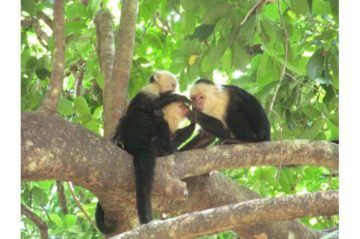Elizabeth Kivowitz in Phys.Org:
 Female white-faced capuchin monkeys living in the tropical dry forests of northwestern Costa Rica may have figured out the secret to a longer life—having fellow females as friends. “As humans, we assume there is some benefit to social interactions, but it is really hard to measure the success of our behavioral strategies,” said UCLA anthropology professor and field primatologist Susan Perry. “Why do we invest so much in our relationships with others? Does it lead to a longer lifespan? Does it lead to more reproductive success? It requires a colossal effort to measure this in humans and other animals.”
Female white-faced capuchin monkeys living in the tropical dry forests of northwestern Costa Rica may have figured out the secret to a longer life—having fellow females as friends. “As humans, we assume there is some benefit to social interactions, but it is really hard to measure the success of our behavioral strategies,” said UCLA anthropology professor and field primatologist Susan Perry. “Why do we invest so much in our relationships with others? Does it lead to a longer lifespan? Does it lead to more reproductive success? It requires a colossal effort to measure this in humans and other animals.”
Perry would know. Since 1990, she has been directing Lomas Barbudal Capuchin Monkey Project in Guanacaste, Costa Rica, where her team of researchers document the daily life of hundreds of large-brained monkeys. While chimpanzees and orangutans are more closely related to humans, the white-faced capuchin monkey has highly sophisticated social structures that influence behavior and are passed to others.
Throughout the year, Perry’s team of graduate students, postdoctoral students, international volunteers and local researchers, trek into the forest for 13-hour days of observation to try to draw conclusions that may help us understand our own relationships, culture and other behaviors.
More here.
